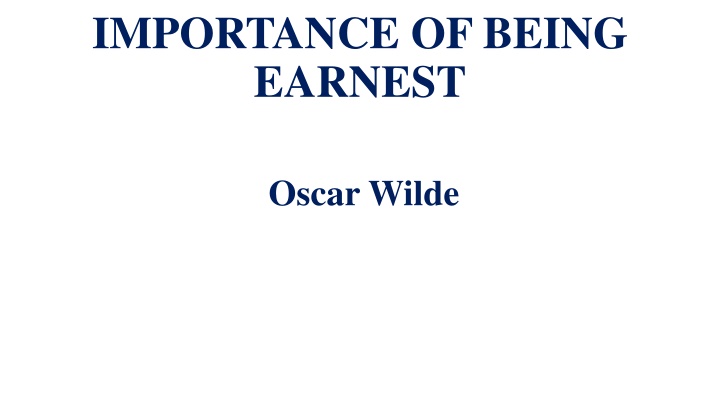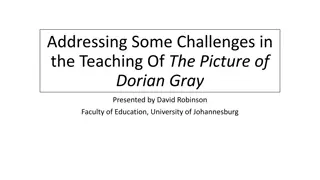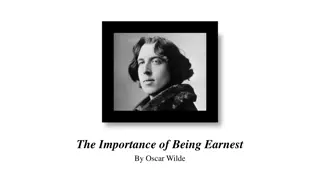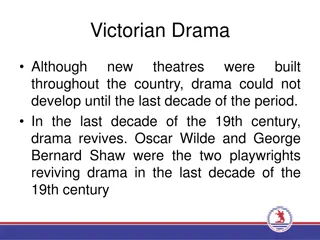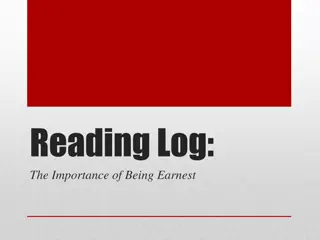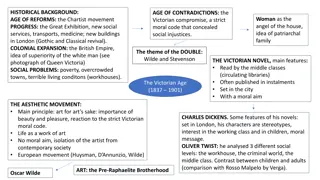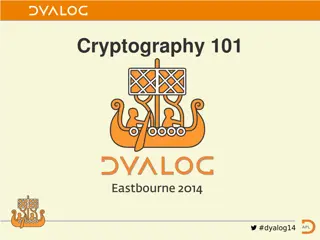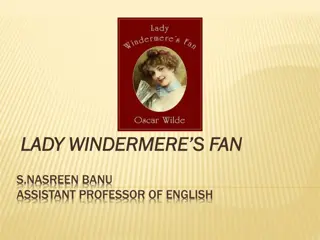Insights into Oscar Wilde and "The Importance of Being Earnest
Oscar Wilde, a renowned author with a unique flair for wit and humor, delved into societal issues in his works like "The Importance of Being Earnest." This play, a farcical comedy, explores themes such as marriage, class distinctions, and the roles of women in society. Wilde's perspective on life, where serious matters are treated with contempt and lighthearted ones seriously, shines through this timeless piece, showcasing the essence of Comedy of Manners and Humours.
Download Presentation

Please find below an Image/Link to download the presentation.
The content on the website is provided AS IS for your information and personal use only. It may not be sold, licensed, or shared on other websites without obtaining consent from the author.If you encounter any issues during the download, it is possible that the publisher has removed the file from their server.
You are allowed to download the files provided on this website for personal or commercial use, subject to the condition that they are used lawfully. All files are the property of their respective owners.
The content on the website is provided AS IS for your information and personal use only. It may not be sold, licensed, or shared on other websites without obtaining consent from the author.
E N D
Presentation Transcript
IMPORTANCE OF BEING EARNEST Oscar Wilde
Oscar Wilde: Life and Works Name: Oscar Fingal O Flahertie Wills Wilde Birth: 16 Oct. 1854, Dublin, Ireland Education: 1871- Trinity College, Dublin 1874 Magdalen College, Oxford Important Works: - Lady Windermere s Fan Salome A Woman of No Importance Importance of Being Earnest De Profundis The Ballad of Reading Gaol Death: 1900 (at the age of 44)
Wilde as an Author Influence of Art for Art s Sake school- Disregard for conventional morality Brilliant wit and sense of humour Remarkable conversational powers (sparkling dialogues) Use of epigrams and paradoxes Importance of Being Earnest Published: 1894 Classified as farcical comedy or at best, Restoration Comedy of Manners (although written at the beginning of the modern age and not in the Restoration period) Wilde s view: the so-called serious things of life should be treated with contempt and the apparently light-hearted things should be treated seriously
Importance of Being Earnest Issues discussed in the play: Women s education Inheritance of property Marriage Illegitimacy Class distinctions in society The role of aristocracy Food, baptism, money etc.
Comedy of Humours and Comedy of Manners Comedy of Humours 1. Popularized by Ben Jonson in Elizabethan Age Comedy of Manners 1. Popularized by William Congreve and Sheridan in the Restoration period 2. Concerned with the display of these passions within everyday life 2.Concerned with the hidden springs of human passions in the form of the four humours (blood, phlegm, yellow bile and black bile) 3. Characters are basically types 3. Characters are men and women of flesh and blood, typically from aristocratic class of society and reflect their follies and foibles
Comedy of Humours and Comedy of Manners continued Comedy of Humours 4. Speaks of an absolute standard 4. Displays utter moral of morality 5. Attempted to be universal 5. Typically temporal Comedy of Manners degradation THEMES The Nature of Marriage The Constraints of Morality Hypocrisy Vs. Inventiveness The Moralism of Victorian Society and its smugness and pomposity
Plot Setting: 1890s (time) London (Act I) and Hertfordshire (Acts II and III) (Place) Plot: Jack Worthing, the protagonist, known as Ernest by his friends in London and Jack by his relations and friends in Hertfordshire, the country, faces numerous problems in his love life before being united with Gwendolen. Prominent among these being objection from Lady Bracknell, Gwendolen s mother- due to Jack s unclear origins and Gwendolen s obsession with the name Ernest. Algernon discovers the duplicity in Jack s life and also that he has a pretty ward in Cecily. Algernon visits Jack s house in Hertfordshire and falls in love with Cecily Gwendolen and Cecily discover the lies told by Jack and Algernon and that none of them is actually named Ernest Miss Prism is proved to be the governesss of Jack as a baby and Jack is in fact Algernon s elder brother
Characters Jack Worthing- apparently a respectable man, guardian to Cecily Cardew Algernon Moncrieef- charming. Idle decorative bachelor, Lady Bracknell s nephew, Gwendolen s cousin, Jack s friend Lady Bracknell- snobbish, mercenary and domineering aunt of Algernon and Gwendolen s mother Hon. Gwendolen Fairfax- Algernon s cousin, represents Victorian womanhood, belongs to the city Cecily Cardew- foil to Gwendolen, nature s child, realistic, ingenious, unspoiled, loves Ernest as the name sounds virtuous Rev. Canon Chasuble- the Rector on Jack s estate, approached by Jack and Algernon to be christened as Ernest, secretly loves Miss Prism Miss prism- governess, uses clich s, Puritan in faith, appears rigid but also has a softer side, approves jack s respectability, bears love for Chasuble Merriman- butler at the Manor House (Jack s estate),seen only I n the last two acts Lane- manservant to Algernon, appears in Act I only, aware about Algernon s Bunburying practice
